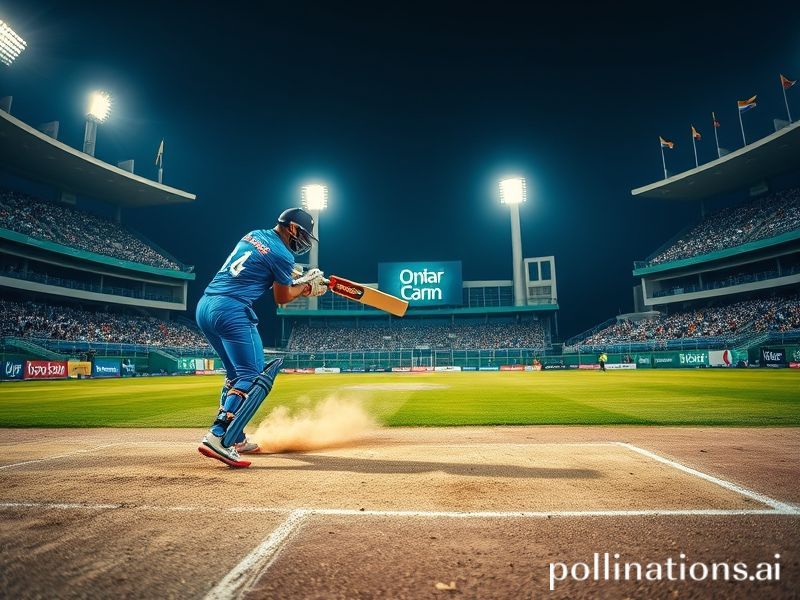Afg vs Sri: The Geopolitical Puppet Show Disguised as a Cricket Match
The World Tunes In to Watch Kabul vs Kandy, Again
By Our Correspondent Who Has Memorized Every Airport Lounge Menu on the Subcontinent
It is a truth universally acknowledged that when Afghanistan and Sri Lanka meet on a cricket pitch, the planet braces itself for a masterclass in geopolitical karaoke. The flags flutter, the anthems play, and 1.3 billion South Asian uncles simultaneously clutch their blood-pressure meds while arguing over WhatsApp voice notes. Meanwhile, on the far side of the globe, a hedge-fund analyst in Connecticut dutifully re-balances his “frontier-market volatility” portfolio, blissfully unaware that the real volatility is unfolding between two nations whose combined GDP is still smaller than the quarterly coffee budget of Amazon Web Services.
Yet here we are—another chapter in the improbable serial called “Afg vs Sri,” a fixture that has quietly become the Cold War of cricket: brief, brutal, and broadcast in 4K to living rooms that still can’t get running water 24/7. The International Cricket Council markets it as a “clash of emerging forces,” which is marketing-speak for “please ignore the collapsing infrastructure behind the curtain.” Sponsors slap their crypto-exchange logos on every spare pixel, confident that nothing says “trustworthy investment” like a pop-up ad superimposed over a country where electricity is a sometimes-food.
On the surface it’s eleven blokes in pyjamas chasing a red leather sphere. Peel back the wrapper, though, and you find a layered parfait of global anxiety. Afghanistan’s squad features players who learned reverse swing in refugee camps and googlies in Peshawar parking lots; several still hold Pakistani passports because paperwork, like peace, is negotiable. Sri Lanka, meanwhile, fields athletes who grew up dodging checkpoints during a civil war that nobody’s insurance policy would touch. In other words, the match is less a contest of runs and wickets than a televised group-therapy session for two nations habitually described in donor reports as “post-conflict,” a euphemism meaning “the shooting stopped but the invoices didn’t.”
The wider implications? Start with China, which has funded ports in Hambantota and copper mines in Logar and now watches benignly as the kids it bankrolled take single-file guard outside off stump. Move on to India, whose satellite dishes beam the match into village huts while Delhi’s think-tanks debate whether a Taliban-friendly six over extra cover counts as soft power. Qatar’s beIN Sports holds the broadcast rights, proving once again that nothing lubricates diplomacy like a shared television contract and a mutual dislike of pirated streams.
Bookies in Dubai and London shift decimal points faster than a Rashid Khan googly, pricing in everything from rain in Kandy to political assassinations in Kabul. The UN, ever eager to be relevant, airlugs a press release condemning “the weaponization of sport,” then quietly books a corporate box for the Super-Over because even multilateral bureaucrats need a thrill. And somewhere in Silicon Valley, an AI start-up trains its sentiment-analysis model on Punjabi swearwords, confident the next unicorn will monetize the collective anguish of 200 million desi fans.
Human nature, ever reliable, does its bit. Twitter threads blossom like roadside poppies after airstrikes, arguing over whether Mujeeb’s carrom ball is legal or merely metaphysical. Sri Lankan expats in Milan WhatsApp money home to fund yet another generator for the neighborhood watch-party, while Afghan kebab-shop owners in Hamburg stream the match on cracked phones propped between meat skewers. Everyone agrees the umpire is blind; no one agrees on which passport he secretly carries.
When the final wicket falls, the world will exhale and pretend the result alters something other than bar-stool bragging rights. Analysts will file reports noting that Afghanistan’s win margin “signals soft-power gains,” while Sri Lanka’s loss “underscores fiscal constraints on sports infrastructure.” Both statements will be correct and entirely meaningless, like describing Hiroshima as a “robust urban-renewal project.” The players will shake hands, the flags will be furled, and the global caravan will roll on to the next fixture—Bangladesh vs Netherlands, if memory serves—leaving behind two countries still negotiating the price of their own survival.
In the end, Afg vs Sri is less a cricket match than a recurring reminder that the world will happily watch you rebuild your house, provided you do it during the ad break. The game will finish, the hashtags will fade, and somewhere a kid in Jalalabad or Jaffna will still be bowling at a makeshift stump made from an AK-47 magazine. Business as usual, then. Just another day on Planet Earth, where hope is optional but the broadcast rights are non-negotiable.







